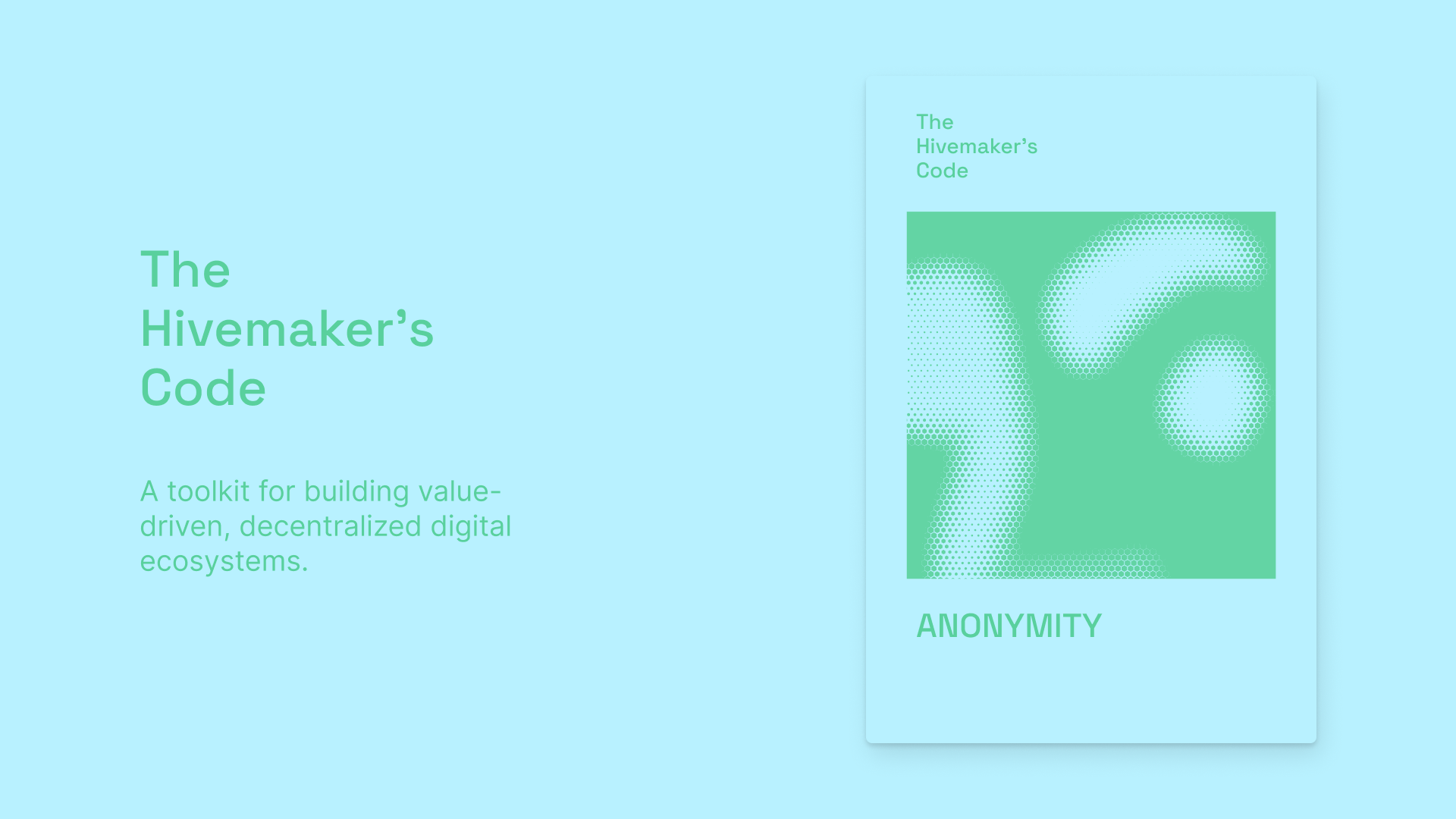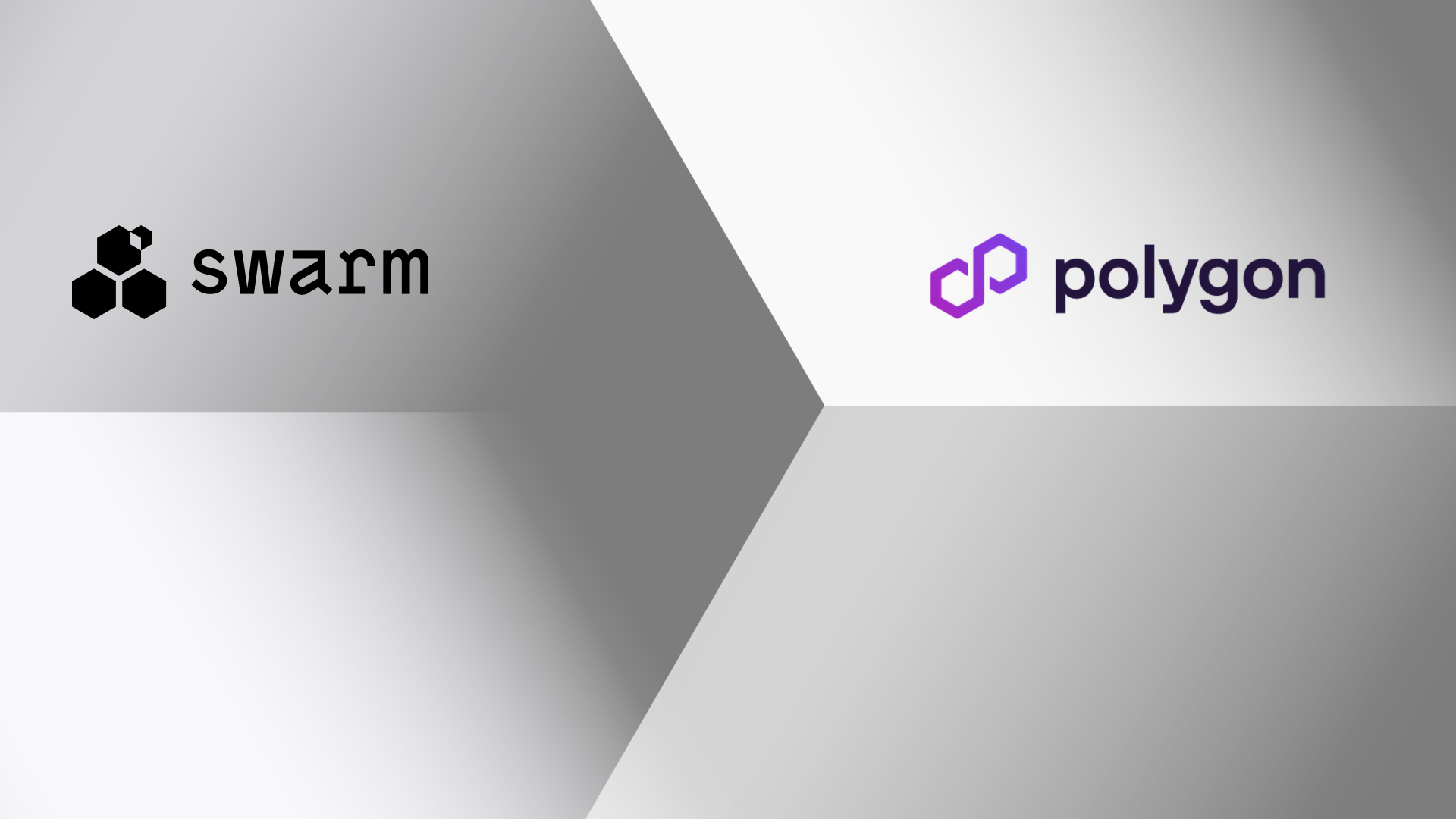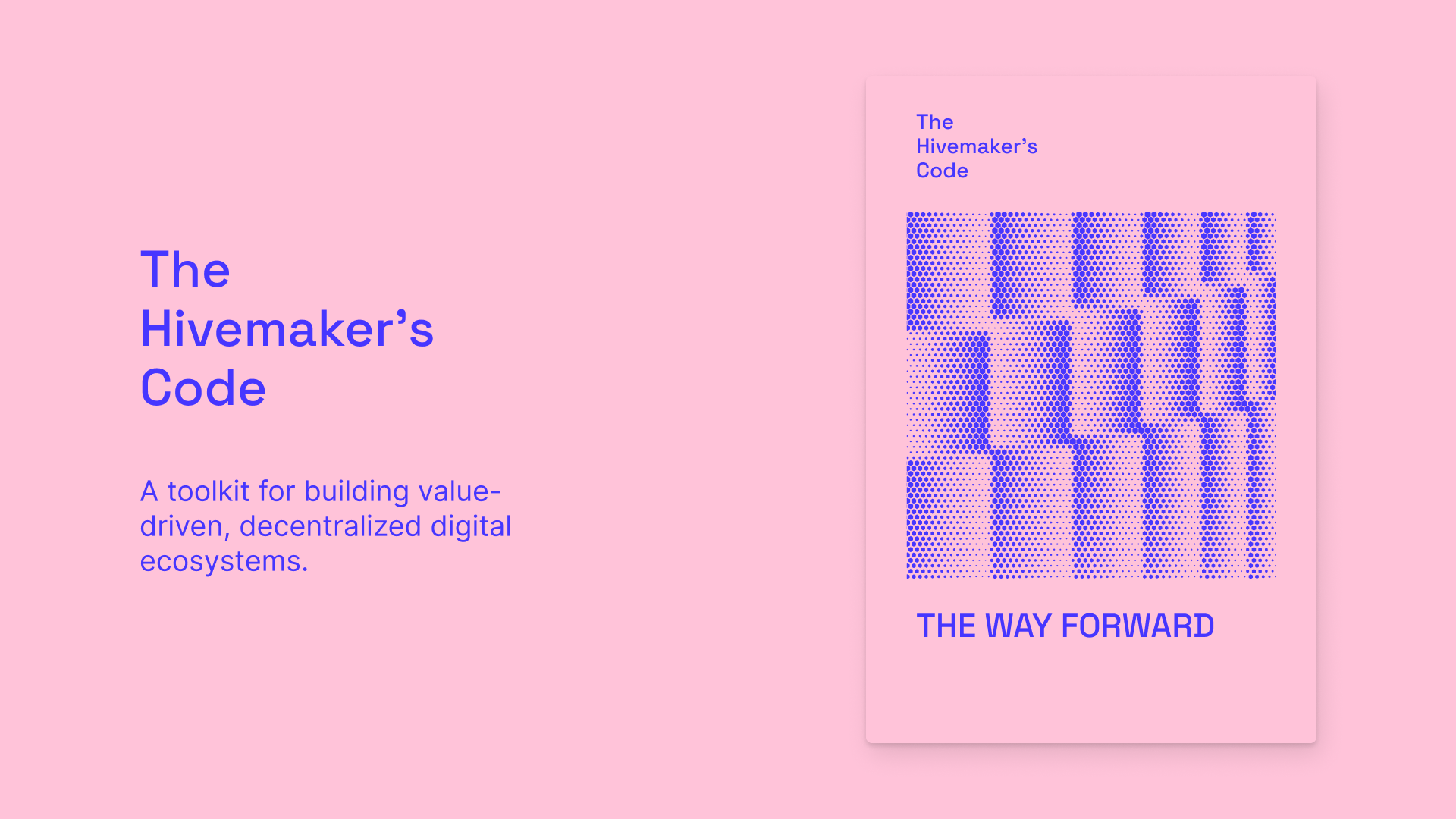This article is part of The Hivemaker’s Code series:
- Article 1: Introduction
- Article 2: How do Ecosystems Grow?
- Article 3: Cooperating on Blockchain
- Article 4: The Satoshi’s Dream
- Article 5: Anonymity in the Cryptosphere
- Article 6: Democracy and Decentralization
- Article 7: Is Net Neutrality Important for Blockchains?
- Article 8: Why Interoperability is the Bedrock of Digital Freedom
- Article 9: The Way Forward
A balancing act between crime and an open society

Authors: Oliver Lukitsch, Michal Matlon, Gregor Žavcer, Thomas Fundneider, Markus Peschl, Lena Müller-Naendrup
Living in the twenties of the 21st century, we find ourselves in an increasingly surveilled world, ranging from our physical spaces to the digital sphere. Yet, privacy and anonymity are pillars of democracy and an open, liberal society. They enable social innovation, whistle-blowing, and investigative journalism around the globe.
The emerging Web3 is an expression of these basic and democratic societal needs. It provides us with digital networks and ecosystems in which people can move privately and anonymously.
The growing usage of blockchain technology now again raises the question of the negative effects of anonymity and the collateral damage it can do to our societies (see the widely discussed example of the Tornado Cash mixer). Let’s go deeper into the topic with an example.
Imagine that you know an enthusiastic and knowledgeable crypto entrepreneur. One day, they present you with a convincing idea of a digital currency for a new ecosystem. You hesitate, then discuss it with like-minded aficionados, and eventually, you buy into the project.
The new currency gets traction. The yields look fantastic. One day, you check the charts and nothing. Your coin’s worth: zero. The entrepreneur is nowhere to be seen and found. All that’s left is empty promises and a crypto-project inexistent.
This is called a “rug-pull.” A developer attracts investors to a project and pulls out before they realize the project. The investors are left with a worthless coin. It’s a common crime in the emerging Web3, taking advantage of people’s appetite for making a quick buck.
This is only one example of criminal activity in the blockchain world. Cryptocurrencies and DeFi protocols can also be used as effective money-laundering instruments. They can be used for credit card fraud, online grooming, and the exploitation of disenfranchised people for criminal action. Moreover, cryptocurrencies can be used as an anonymous, untraceable payment method on darknet markets. Like the famous, now non-existent Silk Road.
The anonymity of blockchain can create a safe harbor for illegal activities. Yet, it is also a vital instrument to safeguard the values of an open, democratic society. In this article, we explore the tension between anonymity/privacy and the need for policing in the cryptosphere. And we look at whether the former contradicts the latter.
What Crimes is Crypto Good For?

There are different types of crimes that crypto networks enable. We cannot provide an exhaustive list here, but we will attempt to provide an overview.
Purchases of illegal goods and Cyber Extortion
Blockchain ecosystems, first and foremost, indirectly impact criminal activities. They allow for safe, untraceable, and anonymous financial transactions. Such purchases do not have to happen on blockchain platforms per se. The dark net is one of the most important marketplaces for illegal drugs, weapons, and even for hiring assassins.
Moreover, it is used by hackers for blackmail, also called “cyber extortion.” The attacker (often using ransomware) steals data and threatens the victim to permanently deprive them of access, sell the data, or make it public. Then, they usually demand their ransom in some cryptocurrency, frequently in Bitcoin.
Rug Pull schemes
Rug Pulls evolved from blockchain technology and specifically from practices in DeFi communities. You recall our example at the beginning of this article. There are different kinds of rug pulls, as the crypto news platform CryptoVantage describes:
- Liquidity stealing: The example we provided at the beginning of this article is a form of liquidity stealing, meaning that, for example, a founder of a coin steals from the liquidity pool of the blockchain project.
- Dump scheme: When developers sell large shares of their tokens, thus crashing the currency’s value
- Limiting sell orders: This is a version of a dump scheme in which developers create tokens that only they can sell.
Interestingly, rug pulls can be considered a cultural phenomenon independently of the technology that enables them. This is particularly evident when considering that the crypto technology being advertised does not even have to exist in the first place. For instance, in 2014, the company OneCoin Ltd. sold a digital coin that was not based on blockchain.
Moreover, in the case of rug pull schemes, the anonymity and privacy of blockchain networks are often only an indirect enabler of criminal activities. On the one hand, developers might already operate anonymously in the cryptosphere to pull off their scams. On the other hand, crypto projects draw in investors because of their value proposition involving decentralization, privacy, and data protection. Unlike in the case of laundering operations, blockchain technologies play a rather passive, fungible role.
One final note on the topic of rug pulls: Sometimes, it is easy to identify a crypto project as a rip-off. However, whether a supposed rug pull is an illegal scheme is a non-trivial question. For instance, some consider the Terra Luna crash a rug pull, while others argue it happened due to the bad design of what was supposed to be a stablecoin (TerraUSD).
Terrorism
At least as of 2020, there was only a little evidence that terrorist organizations have yet turned to the “cybersphere as a revenue-generating tool,” according to Isaac Kfir from the Institute for Economics and Peace. Instead, they used digital platforms for propaganda and recruitment. One reason could be that terrorists see themselves as less technologically literate than national governments and their cyber intelligence services.
However, many terrorist organizations have made their members aware of cryptocurrencies as anonymous payment options. The “Islamic State” reportedly transferred Bitcoin, which was worth millions of dollars at the time, Kfir claims.
Still, for now, cryptocurrencies might be of limited use for terrorist organizations since, ultimately, their operations require goods that cannot be bought with Bitcoin and similar tokens. Moreover, the value of cryptocurrencies is volatile (even in the case of stablecoins, as Terra demonstrated). The upshot: terrorist organizations might find cryptocurrencies and blockchain assets simply too impractical for their goals.
In the current discussion, however, we might risk presenting anonymity one-sidedly as an enabler of crime. Yet, anonymity is not just a matter of convenience. Privacy and anonymity are crucial democratic values that support the functioning of democratic instruments and culture.
Anonymity is Not Just “Nice to Have”

We should consider any constraint on anonymity in light of social openness and democracy. Yet, this is and always has been a premise under threat.
Especially 20th-century social psychology suggested that anonymity drives violence and immoral action. Being anonymous affects both the agent and the victim of immoral actions. According to psychologist Philipp Zimbardo, anonymity reduces the sense of accountability on the one hand. On the other hand, it also reduces the individuality of victims (it leads to so-called “deindividuation”).
But many insights from social psychology date back to the 60s and 70s of the last century. A lot of them have not been replicated or can’t be for moral reasons. A plethora of researchers contested the findings, among them renowned figures such as the historian and journalist Rutger Bregman.
In his book, “Humankind,” Bregman showed that the experimental design of influential studies such as the Stanford prison experiment was flawed, forcing subjects into certain behaviors rather than creating neutral conditions for more spontaneous actions to emerge. Bregman is not the only skeptical voice. But rather than expanding the list here, we want to turn to the positive force of anonymity and why it’s essential for an open society.
Yet, even if anonymity is not a proven driver of immoral action, it can have morally detrimental consequences. But even then, we must be aware that the price to pay for seemingly absolute security will come at the expense of a functioning democracy, plurality, and freedom of expression. Moreover, it will thwart the conditions for social innovation, which are essential for any progressive society to nurture.
Anonymity allows those who report on the shortcomings of powerful (political) organizations, such as whistleblowers and journalists, to express themselves freely – and therefore to drive developments toward a more just society. In that sense, anonymity fosters social innovation.
Just think of the many progressive ideas that were deemed unacceptable and even illegal just decades ago, such as universal voting rights. While they are legal and considered beneficial today, they first required an anonymous sphere for experimentation to gain momentum. Social progress does require defiant anonymity. As does maintaining competitive advantages in the business sphere.
Whether anonymity favors moral bankruptcy or social progress is not a trivial question. It is both an ideological and an empirical one. First, how progress is defined is a matter of ideology. Second, it is a matter of contingent fact whether the socially and morally positive developments outweigh the negative ones – however, we define them. Third, you can argue that if anonymity remains unconstrained, you strengthen the forces that undermine an open society and democracy.
Yet, the latter must not be understood as an argument against_ _anonymity but, at best, an argument for situational, transparent constraints. After all, by refraining from creating and cultivating spaces for anonymity, we risk abandoning the fight for a more just, open, and inclusive society from the outset.
There is no better illustration for the importance of anonymity for an open and democratic society than the process of voting itself. While a public vote can be democratic in some cases, a fundamentally democratic voting procedure always involves anonymity. Nobody but the person voting can know what they are voting for.
Just like we consider the anonymity of voting as the backbone of democracy, we should also pay attention to the fact that anonymity provides the subsoil for democratic self-expression and a space-space for a plurality of opinions to thrive.
The Panopticon
The erosion of privacy is a challenge for democracy in many ways. The example of voting and elections might seem abstract. Yet, surveillance is a far more pervasive problem for society. Surveillance in modern-day society reached another level with the emergence of mass-scale surveillance by digital means. This prompted many to reach for the historical concept of the panopticon. Designed by the English philosopher Jeremy Bentham, the panopticon is an architectural structure in the center of a prison that gives a good view of the cells built in a circle around it. It is an instrument of ubiquitous surveillance.
Thus, it should not come as a surprise that it is a fitting metaphor for how our progressively digitized society and social lives can be monitored in detail by almost any Web2.0 company that provides the underlying structure. As many surveillance scandals show, governments can use centrally communicated and stored user data for their own purposes.
There are two motivations for such surveillance. For Web2.0 companies, it is the ability to sell and profit from user data and big data marketing. For governments, it is policing and security. These motivations or intentions are neither immoral nor politically detrimental per se.
Surveillance and Social Cooling
The fact, however, that misconduct is possible is deeply problematic. Government surveillance is often used to assert political power and repression, as in the case of China, Iran, or Russia. Moreover, whether an intervention is justified often lies in the eye of the beholder. Just as liberal intellectuals such as Noam Chomsky pointed out repeatedly, a genuinely liberal and democratic society should focus on cultivating its capacities to reflect on and debunk misinformation and morally complex opinions, not censor them.
Moreover, the very fitness of a democratic society depends on not being confronted with a digital panopticon. This is reflected in what is called the “social cooling” effect. Social cooling describes the phenomenon that people are less likely to speak their minds and show their true feelings in social engagements when they feel that they are being observed.
However, spontaneous and authentic political self-expression is essential for a society’s character of democratic openness. In other words, it is vital for an open society that opinions can be formed publicly and can be reflected on openly. This is the bedrock of a living ecosystem of opinions and perspectives, which give rise to political plurality and democratic choice. Hence, any digitized society challenges the foundations of its democratic culture by ridding itself of anonymity and by adopting the panopticon.
Data Unions and Big Tech
Another reason, and indeed the very enabler for the existence of the panopticon, is Web2.0 social media companies. We use their services for free. So it seems. Yet, we pay a high price. We pay with our personal data. Moreover, as the last section shows, we might also pay by compromising our democratic values and culture.
This is where we can turn our attention back to a potential inherent to the promise of Web3. So far, users have to comply with the rules of big tech companies, paying a price they are often unaware of. These companies take our data in almost limitless ways, forcing users into opt-ins without presenting alternatives, knowing their users have no leverage.
However, users can demand a proper price tag to be put on their most personal assets. They can do this by engaging in so-called “data unions” that acknowledge the inherent value of people’s data and negotiate fair conditions for their exploitation. Doing so can shift the most basic power relations between social media companies and their users.
Key Insights

- Although anonymity may create a safe harbor for illegal activities, it is also a vital instrument to safeguard the values of an open, democratic society.
- Rug pull schemes are a form of ponzi scheme that caught the public’s attention, though they are not linked to blockchain per se.
- It is unlikely that blockchain technology will foster terrorist activities.
- Anonymity is an elemental condition for exercising democratic processes.
- In the 1970s, the idea emerged in psychology that anonymity could lead to immoral behavior. However, many of these studies have proven suggestive and must be interpreted with caution.
- Surveillance leads to social cooling and a decline of self-expression
- The reversal of data ownership between social media companies and their users can shift the economic power structure between them.
References

- Bregman, Rutger. 2021. Humankind: A Hopeful History. Bloomsbury Publishing.
- Kfir, Isaac. 2020. “Cryptocurrencies, National Security, Crime and Terrorism.” Comparative Strategy 39 (2): 113–27. https://doi.org/10.1080/01495933.2020.1718983.
- Kim, Kyung Kyu, Ae Ri Lee, and Un-Kon Lee. 2019. “Impact of Anonymity on Roles of Personal and Group Identities in Online Communities” 56 (1): 109–21. https://doi.org/10.1016/j.im.2018.07.005.
- Morris, David Z. 2017. “The Rise of Cryptocurrency Ponzi Schemes.” The Atlantic. May 31, 2017. https://www.theatlantic.com/technology/archive/2017/05/cryptocurrency-ponzi-schemes/528624/.
- Team, Chainalysis. 2022. “Crypto Crime Trends for 2022: Illicit Transaction Activity Reaches All-Time High in Value, All-Time Low in Share of All Cryptocurrency Activity.” Chainalysis. January 6, 2022. https://blog.chainalysis.com/reports/2022-crypto-crime-report-introduction/.
- Trozze, Arianna, Josh Kamps, Eray Arda Akartuna, Florian J. Hetzel, Bennett Kleinberg, Toby Davies, and Shane D. Johnson. 2022. “Cryptocurrencies and Future Financial Crime.” Crime Science 11 (1): 1. https://doi.org/10.1186/s40163-021-00163-8.
- “What Are the Biggest Crypto Rug Pulls in History?” 2022. CryptoVantage (blog). June 1, 2022. https://www.cryptovantage.com/news/what-are-the-biggest-crypto-rug-pulls-in-history/.
- “What We Can Learn From OneCoin, Crypto’s Biggest Scam.” 2021. The Motley Fool. October 23, 2021. https://www.fool.com/the-ascent/cryptocurrency/articles/what-we-can-learn-from-onecoin-cryptos-biggest-scam/.
- Zimbardo, Philip. 2008. The Lucifer Effect: How Good People Turn Evil. Random House.
Discussions about Swarm can be found on Reddit.
All tech support and other channels have moved to Discord!
Please feel free to reach out via info@ethswarm.org
Join the newsletter! .




